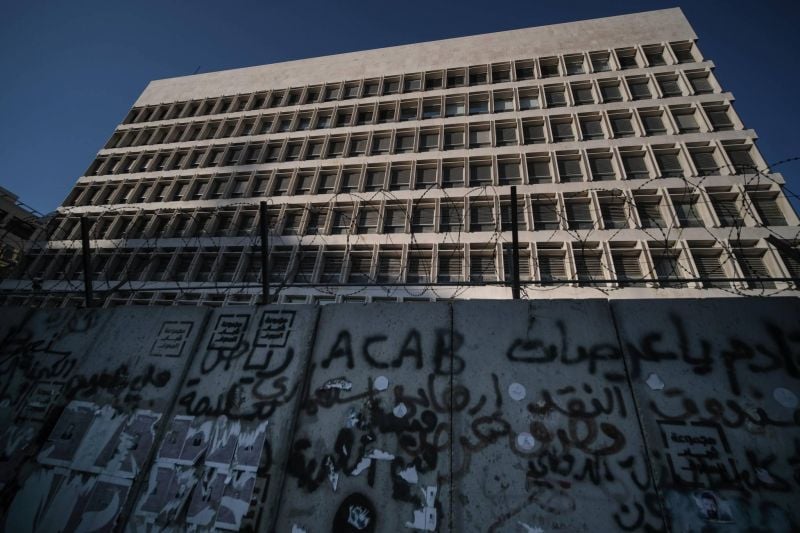
The Banque du Liban headquarters in Beirut. (Credit: João Sousa/L'Orient Today/File photo)
Want to get the Morning Brief by email? Click here to sign up.
A 60-year-old depositor brandishing a bottle of unidentified liquid forcibly withdrew the entirety of his savings from a Banque Misr Liban branch in downtown Beirut yesterday, the Depositors' Cry collective announced. Omar Al-Awwar was transferred to the Bachoura police station in Beirut after holding up the bank to recover his $6,500 deposit, the collective added. “The depositor wasn't armed. He's just sick and needs his money,” Depositors’ Cry member Alaa Khorchid told L’Orient Today. Outraged depositors have used several means — including firearms, gasoline and threats of arson or suicide — in their attempts to circumvent illegal withdrawal restrictions imposed by commercial banks since 2019.
A daycare where children were allegedly being abused will be shuttered, a Health Ministry spokesperson told L’Orient Today. Internal Security Forces (ISF) said they launched an investigation into the daycare after a video circulating on social media showed a staff member striking young infants and force-feeding them. The ministry added that it "will not, under any circumstances, allow actions that are inappropriate for those who should be taking care of children and protecting them." Last November, the Health Ministry shuttered a daycare in Bchamoun due to negligence after images surfaced of a child injured while in their care, reportedly after being beaten by another child in the facility.
Videos circulating on social media showed caretaker Education Minister Abbas Halabi’s convoy being kicked and pelted during his tour of a high school on the first day of the official Lebanese baccalaureate exams. An alleged member of the General Union of Students in Lebanon denounced "policies that undermine public education” and called for “a fair solution for students” taking the exam. After a start to the school year marred by equipment shortages and understaffing, public schooling was interrupted for several months due to a strike by teachers demanding improved compensation. “I had to take one of two decisions: cancel the official exams or organize them, even with the minimum. I opted for a lighter exam load,” Halabi told L’Orient Today in May, after 40 percent of the curriculum included in the exams was cut. Halabi justified the decision by saying it will allow students to move on to higher education. UNESCO education specialist Maysoun Chehab claimed foreign universities would question Lebanese students’ capabilities, while Lebanese University president Bassam Bedran expressed fear over new high school graduates’ preparedness for college-level learning.
Banque du Liban (BDL) governor Riad Salameh’s term will not be extended, caretaker Prime Minister Najib Mikati’s office reaffirmed in a statement seen by Reuters, just weeks before the central bank chief concludes his 30 years in office with no definite successor in sight. “The most important thing is that no vacuum occurs at the central bank,” the statement said, reiterating Mikati’s view that first Deputy Governor Wassim Manssouri should take the reins after Salameh’s term ends on July 31. Last week, Manssouri and BDL’s three other deputy governors threatened to resign if no successor to Salameh is named. Several parties consider the caretaker cabinet unable to name a new central bank governor amid the presidential vacuum. Key appointments to the Lebanese Army and security services have also been held up due to Parliament’s inability to elect a president. Salameh, once lauded for his shrewd central bank leadership, ends three decades in office facing an Interpol red notice, along with domestic and international corruption and embezzlement charges.
“We want [Israel] to retreat from northern Ghajar,” caretaker Foreign Affairs Minister Abdallah Bou Habib responded after the United Nations peacekeeping leadership relayed an Israeli demand for the removal of a tent allegedly set up by Hezbollah along the southern Lebanese border, the state-run National News Agency reported. “From our side, we have recorded around 18 Israeli violations on the borders,” Bou Habib added, without indicating the exact time period of those violations. The discussion followed a brief rocket exchange between Israel and unidentified parties in South Lebanon last Thursday. Days prior to the artillery crossfire, Israel set up a fence enclosing the northern part of the village of Ghajar, which is split in two by the UN-drawn Blue Line. Forces of Change MPs on Sunday visited the outskirts of the village to denounce its absorption into Israel. Also on Sunday, Forces of Change MP Mark Daou, who was not part of the visit, vowed to continue confronting Hezbollah’s “non-state weapons” which he considered “a permanent threat” to Lebanon.
In case you missed it, here’s our must-read story from yesterday: “State spending and the 2017 salary law”
Compiled by Abbas Mahfouz
